What Is Jupiter?
Jupiter is a DEX aggregator on Solana that is designed to help users discover the "best price" in one place. It also has advanced features to improve accessibility, such as limit orders and dollar-cost averaging.
Key Takeaways
-
Jupiter is a DEX aggregator on the Solana blockchain. It offers users several options for their financial transactions by connecting them with multiple decentralized exchanges on the network.
-
Jupiter offers additional services and features including a limit order swap feature that allows users to set preferred conditions for their transactions, along with dollar-cost averaging (DCA), enabling users can to set up periodic purchases over a time period.
-
Jupiter's native token is JUP, which will be launched in end January 2024. The token will be allocated evenly between the team and community.
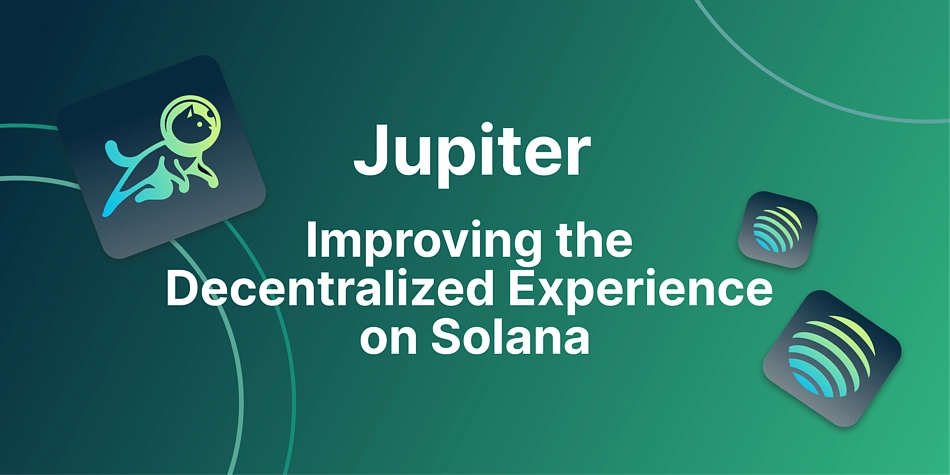
Solana hosts several decentralized exchanges that offer direct asset swaps using liquidity pools and the automated market maker (AMM). However, liquidity conditions across the different asset pairs on these exchanges differ. As a result, prices of the same asset could differ significantly, and the liquidity conditions could also lead to higher slippage on some of these exchanges. Jupiter, a DEX aggregator on Solana, is designed to help users discover the best rates in one place, while offering users features like limit orders and dollar-cost averaging (DCA).
Jupiter was launched in 2021 and is dedicated to creating a platform for DeFi enthusiasts on the Solana network. It claims that this platform is cost-efficient, encourages the best use of protocols on the network, and promotes the adoption of the Solana blockchain for decentralized finance.
Understanding Jupiter: A DEX Aggregator on Solana
Jupiter is a full stack ecosystem play to make the decentralized experience better than the centralized one.
— meow 🥧 (@weremeow) December 20, 2023
- Full array of world class trading products
- Full support for good new projects and tokens
- Full integration of all liquidity avaiable on Solana
I am not being… https://t.co/YCnqrrGpdt
According to data from the network’s explorer, Jupiter is one of Solana blockchain’s most used applications. Jupiter claims to process an average of $350 million worth of crypto assets trades daily from over 100,000 unique wallets.
Jupiter is a DEX aggregator; it connects to several decentralized exchanges to provide users with an interaction pathway to these exchanges from one interface. Through this connection, Jupiter is able to obtain core data like liquidity conditions across asset pairs, prices of assets and fees charged by the liquidity providers, and more. Using this data, Jupiter then selects a route for the user's transaction.
Depending on presiding conditions, the transaction could be routed through multiple liquidity pools. Each iteration is known as a Hop, and a single swap transaction could go through 3 Hops. Jupiter claims that this system enables traders to easily use the most effective and resource-efficient facility for each transaction. Jupiter claims that its aggregator connects to over 20 DEXs and AMMs on the Solana network.
However, Jupiter’s utility isn’t limited to direct asset swaps through multiple exchanges. The platform features a handful of other advanced utilities to improve the user experience.
Key Features of Jupiter
Now, let’s take a look at some of these advanced utilities and what they offer Jupiter users.
Limit Orders
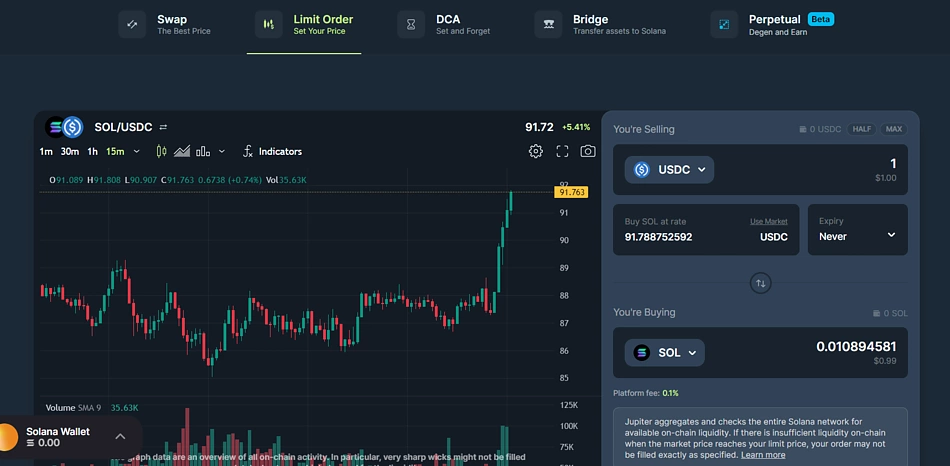
Centralized exchanges are known to offer limit orders. Limit orders enable traders to set up a trade that only executes when the stated conditions are met. This is easier for such platforms since they run an order book system, which uses a record of buy and sell requests for an asset pair. For decentralized exchanges, this is a bit more complicated due to the nature of the AMM and liquidity pools.
However, Jupiter offers limit orders. On Jupiter, when a user places a limit order, the protocol holds the order including details of set parameters (selling/buying price and quantity) in the limit order protocol. The protocol then obtains prices from supported decentralized exchanges and monitors changes in these prices. When the market price reaches the point set by the trader, it moves to execute the trade. In case the on-chain liquidity is insufficient for the order size, it executes the trades in smaller portions until the order is completed.
Jupiter claims that its decentralized limit order feature works with the same efficiency as centralized limit orders. The only difference is the absence of market makers, an order book, and a centralized control system.
Dollar-Cost Averaging
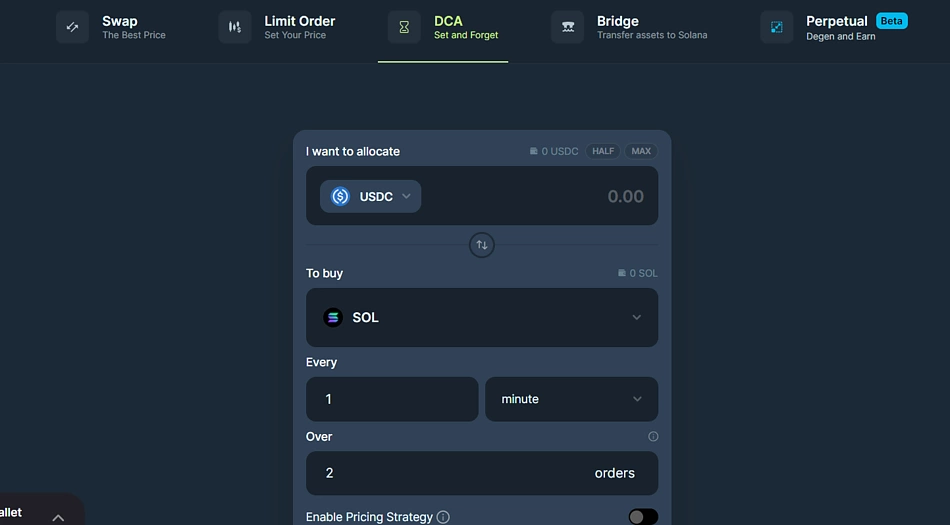
Dollar-Cost Averaging (DCA) is a popular approach for spot purchase of assets. Here, traders split their transactions to sell or purchase an asset over time at different periods. The idea is to increase the trader’s chances of capturing different peak points (for sales) and lows (for purchase) instead of trading all at once and a single price point.
Using Jupiter's DCA feature, traders commit their capital to the trade and specify the different price points (or range) they wish to make a purchase and the amount for each of these, along with the time interval for this trade.
For instance, a trader might decide to purchase $1,000 worth of Solana (SOL) over ten days (note that the interval is flexible and could be set to hours and minutes) and wish to commit $100 every day at certain price levels. The protocol moves $1,000 to the DCA program, which is held in the trader’s vault. When each trade is executed, the asset is transferred to the trader’s wallet. For assets other than SOL, the trader must create an Associated Token Account (ATA) to enable the automatic transfer of purchased tokens to their wallet.
Bridge
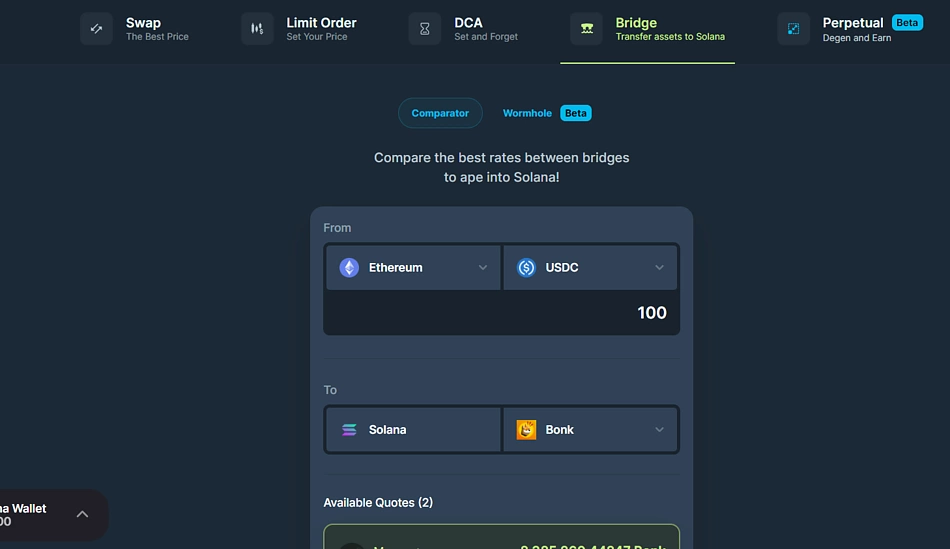
Jupiter is a bridge aggregator as well. In a fashion similar to its DEX aggregator, it collates data from supported bridges and presents users with available routes for their bridging transaction, the details of these routes, and a suggested route according to presiding conditions. After choosing their route, users are redirected to their preferred bridge to complete their transactions. Bridging facilities supported by Jupiter include Mayan Finance and Debridge.
Jupiter also supports Wormhole for asset bridging. Wormhole is an inter-network messaging protocol that enables advanced communication between blockchain networks. At the time of writing, Jupiter’s bridge powered by Wormhole supports the bridging of assets between the Ethereum and Solana blockchains.
Perpetuals
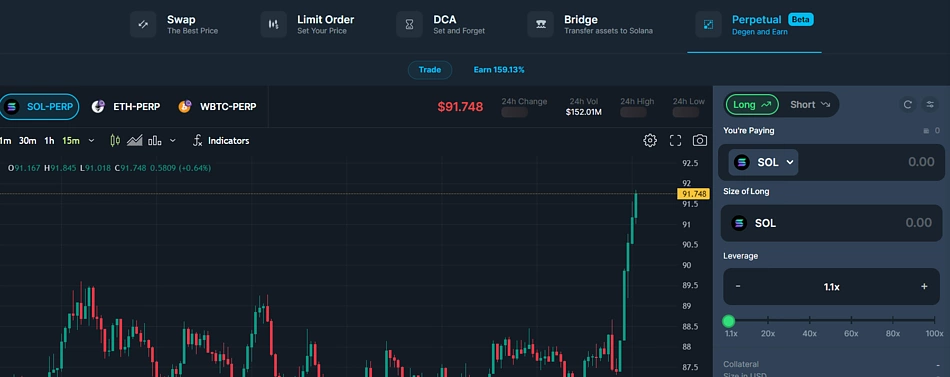
Perpetual traders bet on the future price of an asset. Jupiter features a decentralized perpetuals trading platform where users can take long or short positions with up to 100x leverage. Users can participate as traders or liquidity providers. Liquidity providers on the derivative trading platform lock up their assets in the perpetuals vault and earn as traders use these funds for their trades. The perpetual vault currently supports five assets; WBTC, USDT, USDC, SOL, and ETH.
Traders commit collateral and obtain funds from the vault to the tune of their collateral and the chosen multiplier. For instance, if a trader uses the 5X leverage on $20 worth of collateral, the capital for the trade becomes $100 (20 * 5). The perpetual trading platform works just like other centralized derivatives trading platforms. However, the funds for the leverage are contributed by the liquidity providers. According to Jupiter, the perpetuals trading facility ensures zero price impact, zero slippage, and deep liquidity by utilizing LP pool liquidity and oracles. It uses Pyth network’s oracle for its price feed.
Jupiter LFG: A Launchpad for Solana Projects
On January 23, 2024, the pseudonym behind the development of Jupiter announced the launch of LFG, a launchpad for Solana projects via a post on X.
According to the announcement post, LFG will serve as a platform that guides new projects to the market. They claim that the LFG launchpad will be solely backed by the community and will not have any incentive provisions or price discovery system. They claim that the Jupiter DAO will oversee the core aspects of the launchpad, including the approval of projects to launch using the facility via a community vote.
Approved projects will benefit from the technological assistance of the Jupiter platform including a customized launchpool, composable liquidity pool and integration with a full network of bots that the project can use. With the launchpad, Jupiter hopes to guide new projects to success and protects their buyers from hype, fomo and rugs.
How to Swap With Jupiter.
To use Jupiter, visit the official website.
Click Connect Wallet from the landing page to connect your wallet to the platform.
You can perform a Direct Swap, set Limit Orders, or use the DCA feature for your swaps on Jupiter.
Direct Swaps on Jupiter
To perform a Direct Swap, navigate to the Swap section
-
Select the assets wish you to swap.
-
Enter the amount you wish to swap.
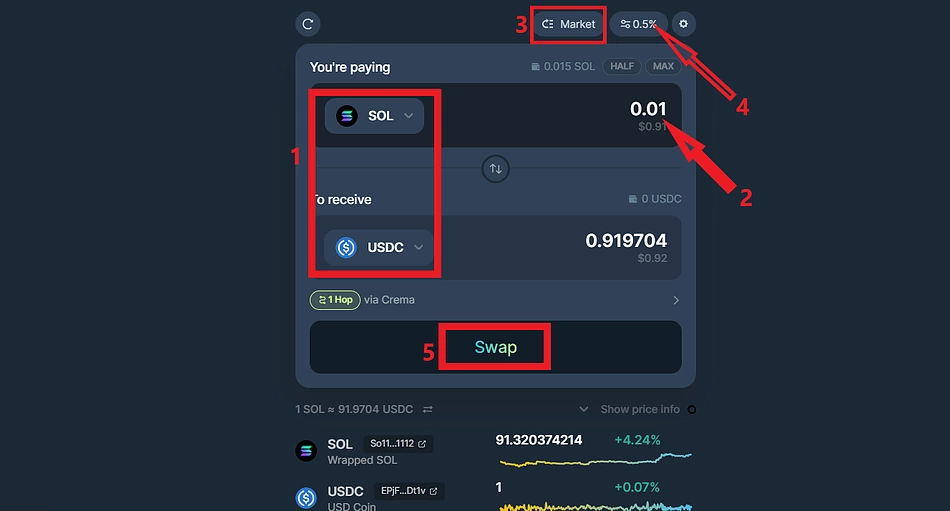
-
Click Market from the swap interface and set a priority for your transaction.
To execute the transaction faster, you can set a higher priority, although this will likely result in higher fees.
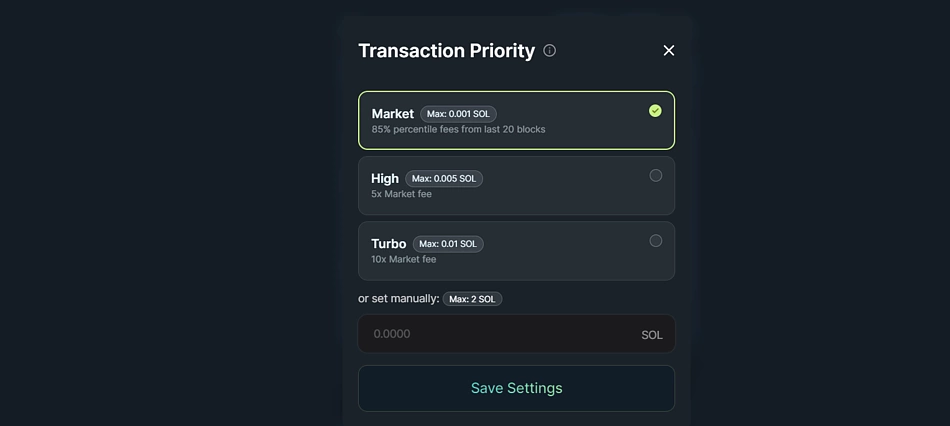
-
Set the slippage tolerance for your transaction.
-
Click Swap to continue.
Approve the transaction from your wallet to complete.
Limit Order Swaps on Jupiter
To place a limit order swap, head to the Limit Order section.
-
Select the assets you wish to swap.
-
Set a sell price for your order.
-
Set an expiry period for your order.
-
Set the amount you wish to exchange.
-
Click Place Limit Order to continue.
Approve the transaction from your wallet to complete.
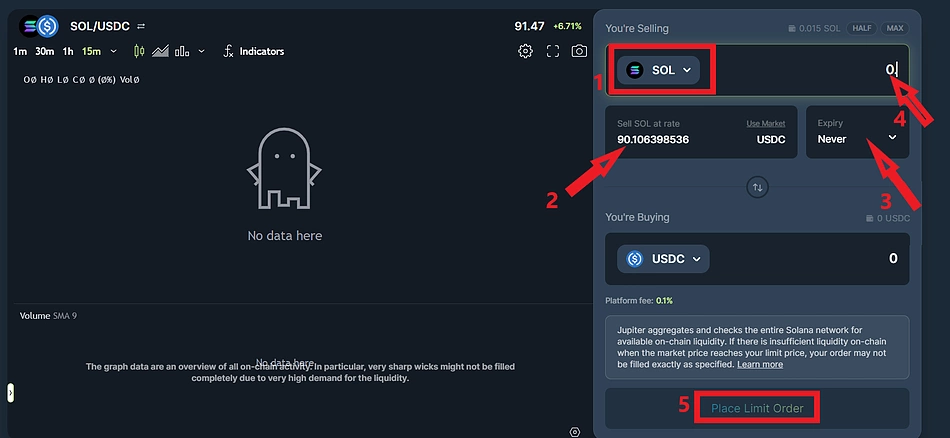
Dollar-Cost Averaging With Jupiter
To DCA, navigate to the DCA section.
-
Select the assets you wish to swap.
-
Set an interval for the DCA swaps.
-
Enter the number of orders for the swap.
To enable pricing strategy, toggle the Switch icon in the at section and enter a price range for your swap
-
Click Start DCA to continue.
Approve the transaction from your wallet to complete.
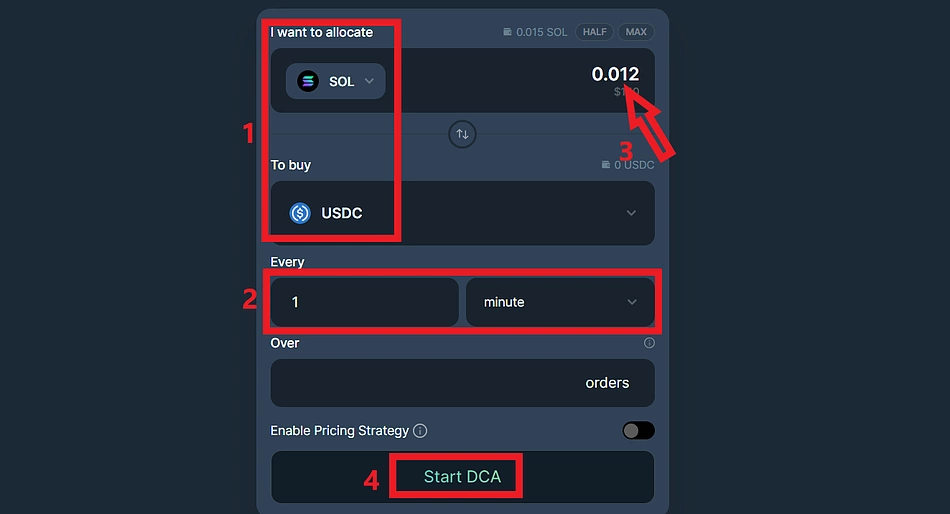
Jupiter Token (JUP)
The Jupiter team has shared plans for the launch of JUP, the native token of the platform. According to available information, the JUP token will not only be integrated into the project, but is meant to create a relationship between the project team, early supporters, and the growing community. Via a post on X, the Jupiter team shared that the total supply of JUP tokens will be set at 10 billion. This will be split evenly between team usage and community usage.

An update from the project claims that 10% of the total supply of these tokens will be used for initial liquidity provision for the JUP token. The rest of the team supply will be split between a ‘strategic reserve’ and the team itself. The team’s tokens will start vesting after a year for two years. The 50% set aside for the community will be committed to community reward programs including an airdrop for early supporters and community grants. At launch, 15-20% of the total supply will go into circulation, with 10% from the first upcoming airdrop and 5% for liqudity provision. According to the team, this is scheduled for January 2024.
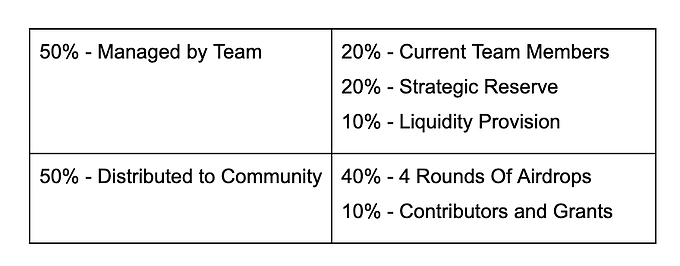
Source: https://station.jup.ag/blog/
Jupiter token will power the Jupiter DAO. The community will pioneer the affairs of the project via the DAO. To find out more, check out the project team’s propositions for the JUP token.
Jupiter Token Airdrop
The Jupiter team has also shared additional information regarding an airdrop program for the project’s community. The JUP token tokenomics includes a 40% reserve for community reward programs. According to the team, there will be multiple rounds of airdrops starting with a 1B JUP token airdrop for the first round of airdrops scheduled for January 2024.
20% of the airdrop allocation will be distributed equally amongst all qualifying wallets. Community members who are active on social media will split 10% of the airdrop while the rest (70%) will be distributed to eligible wallets according to the volume transacted on the platform.
Interacting with the Jupiter platform directly or through other related platforms is the primary qualification criteria for the JUP airdrop. The team hints that token allocation per wallet will be weighed according to the frequency of interaction and total volume transacted.
There is also an OG Bonus, for users that transacted at least $10 on Jupiter before the end of March 2022.
You can check your allocation of JUP at Jupiter’s official airdrop checker.
Looking for more information on the airdrop? Read the project team’s announcement regarding the JUP token airdrop.
Final Thoughts
On Solana, Jupiter offers users a one-stop destination that lets users get the “best price” for their swap in one place. As an aggregator, it can retrieve prices and liquidity from all DEXs connected to it. On top of that, it offers users more advanced DEX features focused on accessibility and the user experience, such as limit orders and DCA, which reduces the friction for users that are more used to centralized exchanges.
Having said this, it is still important to state that while these features are designed for ease-of-use, users still need to understand the basis of each operation. While this article provides an overview and introduction to Jupiter, there are other features, such as perpetuals, which are not covered here. This article is written for educational purposes only and should not be taken as financial advice. Always do your own research on any protocol before signing permissions with your wallet.

Joel is deeply interested in the technologies behind cryptocurrencies and blockchain networks. In his over 7 years of involvement in the space, he helps startups build a stronger internet presence through written content. Follow the author on Twitter @agboifesinachi


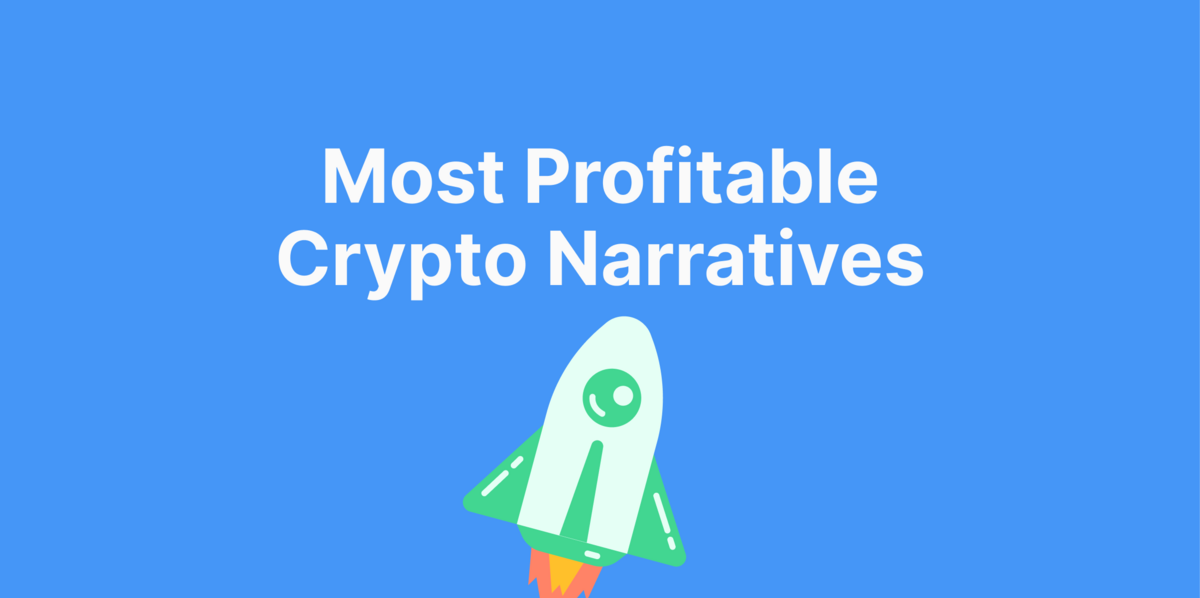

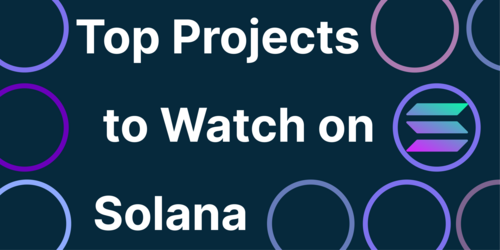




 Or check it out in the app stores
Or check it out in the app stores